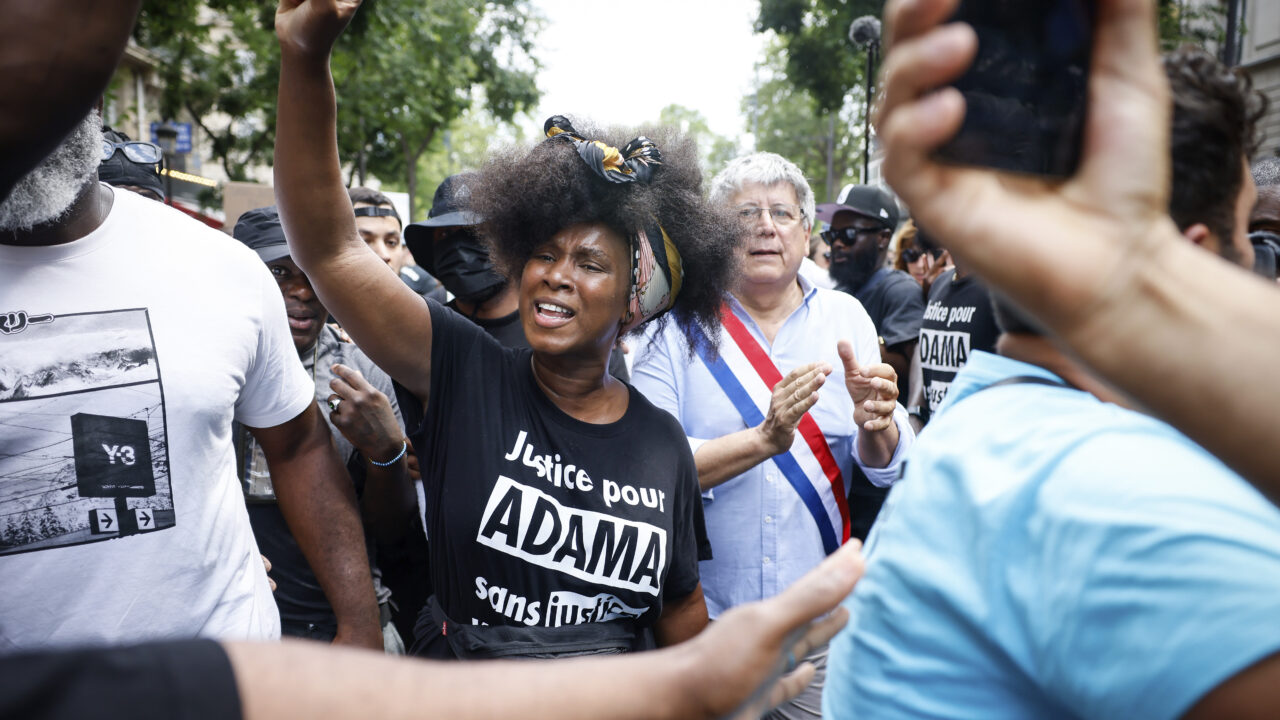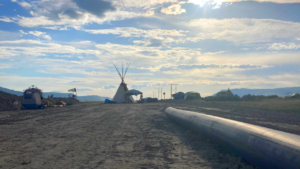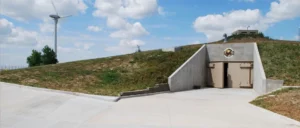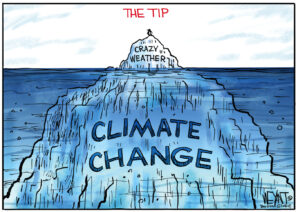France Swept by Dual Uprising for ‘Habitable World’
One side of the uprising is about the habitability of Earth, the other is about the habitability of France for communities of color. Assa Traore, whose brother Adama died in the custody of French police in 2016, raises her fist during a banned protest against police violence in Paris in July 2023. At right is parliament member Eric Coquerel. (AP Photo/Thomas Padilla)
Assa Traore, whose brother Adama died in the custody of French police in 2016, raises her fist during a banned protest against police violence in Paris in July 2023. At right is parliament member Eric Coquerel. (AP Photo/Thomas Padilla)
On June 27, Nahel Merzouk, a 17-year-old French boy of North African descent was murdered by a white police officer in a Parisian suburb. Since then, anger has erupted almost everywhere in the country, especially in poor neighborhoods. Young people are taking to the streets to protest against police violence and state racism. Their anger is eruptive.
Recently, I helped organize support and solidarity for another uprising in France: Soulèvements de la terre, or Earth’s uprising. This movement, created in 2021, is fighting against large and useless infrastructure (like highways and giant tunnels under the Alps), transnational corporations and other sources of pollution and environmental destruction. At one recent action against a giant water-reservoir designed to support industrial farming, two protesters ended up in comas — the result of explosions from police grenades banned in most European countries, but not France.
Since then, several spokespersons and coordinators of Soulèvements de la terre have been arrested and interrogated by the counter-terrorism service. A couple of weeks ago, the government decided to outlaw the group. Now, anyone claiming to be a member of the movement is committing a criminal offense.
The “system” change that we’ve been demanding for many years is, first and foremost, about achieving full decolonization.
The near simultaneous occurrence of these two uprisings is more than a coincidence. It begs the question: Are these not actually two sides of the same coin, two moments in one larger uprising?
As an activist trained in nonviolent direct action, I’m obviously partly unsettled by the eruptive protests following Nahel’s murder. Burning public libraries, crashing a car into a mayor’s house and trying to set it on fire, looting shops, and destroying buses and tramways doesn’t belong to the action repertoire I follow. If someone would mention these as potential tactics for a protest I would organize, I would vehemently counter-argue or simply not take part in such a protest. I feel more comfortable pushing through police lines to block a coal mine or disrupt a meeting of executives from the fossil fuel industry.
But my preferences don’t matter at all here, for several reasons.
First, alliances are not built upon tactical discussions. Debates and disputes over tactics tend to steal the whole conversation when we’re strategically lost. There’s always plenty of time later to agree to disagree. Alliances emerge from something else: a shared experience (or a shared anger); a set of demands that can be articulated in a way that makes them stronger; a common horizon; or a shared political project.
As for the second, and most important, reason why arguing over tactics is a bad idea: Just like Soulèvements de la terre, the ongoing uprising is about habitability and land.
French activist Fatima Ouassak explains that people living in poor neighborhoods are “landless.” People who originally migrated from Africa to France are, according to her, “deprived of land.” Henceforth, what is at stake when they organize is to claim the right to land. Interestingly enough, the French language offers only one word for both land and Earth: “terre.” The Earth’s Uprising would as well be the Land’s Uprising.
At a protest to support the Soulèvements de la terre, feminist, anti-racist and anti-colonial activist Françoise Verges explained that the system that the Earth’s uprising is fighting against (a vision of nature as a bottomless pit of resources one can indefinitely extract) started in the colonies, under the slavery-plantation system. Indeed, the “system” change that we’ve been demanding for many years is, first and foremost, about achieving full decolonization. Those facing, on a day-to-day basis, state racism and police brutality are therefore on the frontline of this fight.
The fact that I feel unsettled when I see people burn a library or a public transport infrastructure is as much a disagreement over tactics as it is a manifestation of my own background: I had the privilege to be trained in nonviolent direct action. I was taught how to channel my anger into a strategic plan, whose horizon shall remain the famous Gandhian “constructive program.” I feel privileged to experience the current state of the world without erupting and bursting out in rage — and to instead think about strategies, alliances and campaign goals.
This is precisely why the current manifestation of anger shouldn’t be dismissed as illegitimate, or as something not smart or disciplined enough for a good campaign. After all, the climate movement is currently debating whether or not we should “blow up pipelines.” We would therefore be hypocrites to criticize those setting fire to the very French institutions oppressing them.
Ultimately, we are not facing two consecutive uprisings, but rather one, two-sided uprising. One side is about the habitability of the Earth, the other is about the habitability of France for Black, Indigenous and people of color. With this understanding comes quite a few strategic consequences.
It has to begin where the cycle of violence has started: police brutality and repression.
For starters, we should demand full amnesty for anyone who has recently been (or will be) arrested, whether they were taking part in the popular neighborhood uprising or in a protest organized by the Soulèvements de la terre. This is key: Since this is about dismantling the existing colonial matrix of power, we won’t return to an appeased situation without breaking with the cycle of violence. It has to begin where the cycle of violence has started: police brutality and repression.
Yes, there’s a lot of anger and rage, and some of it is expressed in ways that are, to say the least, challenging. This is precisely why the cycle of violence has to stop — and it won’t stop in a sustainable and fair way unless the state does its part. It would be unfair and short-sighted to put the responsibility of breaking with the current cycle of violence on those who are protesting, expressing their anger and desire to not be victims of state racism any more.
People are rising up to defend a habitable world — some from the countryside, on the frontline of the extraction of natural resources, and others in dense urban areas, on the frontline of the extraction of the lives of oppressed and colonized people.
We should then try and seek inspiration from movements that have tried to connect similar dynamics. One obvious example is the Breathe Act, developed by the Movement for Black Lives. This visionary bill aims to defund the police, develop community-owned ways of ensuring safety, and promote environmental and climate justice. In the words of one of its creators, Gina Clayton Johnson, “We know the solution has to be as big as the 400-year-old problem itself.”
This visionary proposal combines the necessity of dismantling the institutions that are making the world inhabitable and the vision of what needs to be done in order to restore the conditions for justice. In other words, it seeks to preserve the habitability of the world. This could be a way for the French left to finally address the issue of structural racism and break with its color-blindness. Opening eyes to the reasons behind this side of the ongoing uprising is a first step toward supporting the fight for a habitable world for everyone.
Your support matters…Independent journalism is under threat and overshadowed by heavily funded mainstream media.
You can help level the playing field. Become a member.
Your tax-deductible contribution keeps us digging beneath the headlines to give you thought-provoking, investigative reporting and analysis that unearths what's really happening- without compromise.
Give today to support our courageous, independent journalists.






You need to be a supporter to comment.
There are currently no responses to this article.
Be the first to respond.